The 60 Unhealthiest Grocery Store Foods in America

Shopping for healthy food at the grocery store can be intimidating, especially with endless choices and confusing labels. It can be difficult to know what to buy if you don’t know where to start. Understanding which grocery store foods are the unhealthiest can help you make more informed choices and simplify your shopping experience.
One of the hardest parts about grocery shopping is not knowing what you’re really getting with a product. Companies often use certain lingo on their packaging for marketing purposes, but it doesn’t guarantee that you’re getting a healthy food item. This is especially true with processed items like cereals, frozen meals, pastries, and bread, where companies commonly make their products seem healthier than they really are.
Choosing healthy items depends on the types of food you like and your personal nutrition goals. As a starting point, here are a few things to look at on the nutrition label when trying to avoid unhealthy grocery items:
- Added sugars: Many processed foods contain added sugars to enhance the taste, but consuming these sugars in excess has been linked to high blood pressure, weight gain, diabetes, and heart disease. To avoid these risks, the American Heart Association (AHA) recommends that women limit their intake to no more than 25 grams per day and men to no more than 36 grams.
- Sodium levels: According to the FDA, people should consume no more than 2,300 milligrams a day, and consistently eating too much can lead to heart complications and high blood pressure.
- Saturated fat: Saturated fat is fine in moderation but has been linked to an increased risk of heart disease when consumed in excess. Because of this, the AHA suggests keeping your intake at around 13 grams on a 2,000-calorie diet.
If this still feels overwhelming, don’t fret. We’ve done the grunt work for you and have gathered 60 of the unhealthiest grocery store foods to avoid—all divided by category so you can shop even easier. Read on, then check out the 30 Unhealthiest Snacks on the Planet.
Pasta & Grains
Rice-A-Roni Cheddar Broccoli
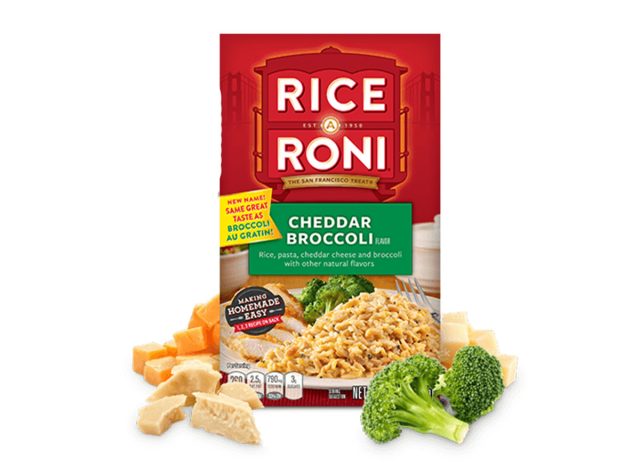
Rice-A-Roni gives you the option to make a quick rice dish with little to no effort, but this instant rice contains a lengthy ingredients list with things like partially hydrogenated palm oil—which is known to potentially contribute to various heart issues—as well as 2.5 grams of saturated fat and 790 milligrams of sodium per serving.
Rice-A-Roni Herb & Butter
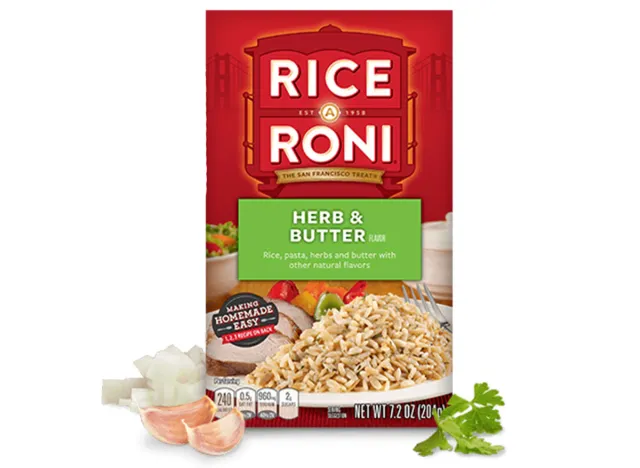
Similar to the Rice-A-Roni Cheddar Broccoli flavor, this brand’s Herb & Butter is also considered an unhealthy option because of some of its less-than-desirable ingredients like hydrogenated palm oil and corn syrup. Not to mention, each serving of this rice comes with a whopping 960 milligrams of sodium. According to the FDA, the average adult should limit their sodium consumption to no more than 2,300 milligrams per day, and those with heart issues should keep it closer to 1,500 milligrams. This rice gets you far too close to these limits for just one side item.
Knorr Chicken Broccoli Rice
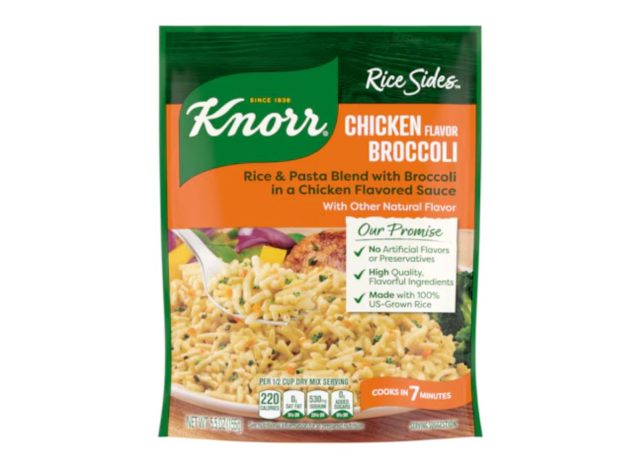
There’s a pattern here with instant rice dishes being some of the unhealthiest grocery store foods because of their high levels of sodium, and the Knorr Chicken Broccoli Rice is no exception.
Velveeta Shells

Everyone loves a creamy bowl of mac and cheese, and Velveeta is famous for its quick, cheap, and delicious boxed mac and cheese that is creamier than those powdered cheese options. Unfortunately, these cheesy shells are better if consumed in moderation, as it’s loaded with 860 milligrams per serving and three grams of saturated fat.
It’s also important to note that Velveeta Shells are made with sodium phosphates, which are additives commonly found in processed meats that have been linked to vascular damage.
Nissin Chow Mein Chicken

It doesn’t take more than one quick glance at the nutrition information for these Chow Mein Noodles by Nissan to see why they’d make the list of unhealthiest grocery items. In one container of noodles, you get over 1,100 milligrams of sodium (almost half your daily limit) and nine grams of saturated fat. The American Heart Association suggests that the average adult limit their intake of saturated fat to around 13 grams per day, so this chow mein is getting you a bit too close to this daily limit.
Kraft White Cheddar Pasta Shells
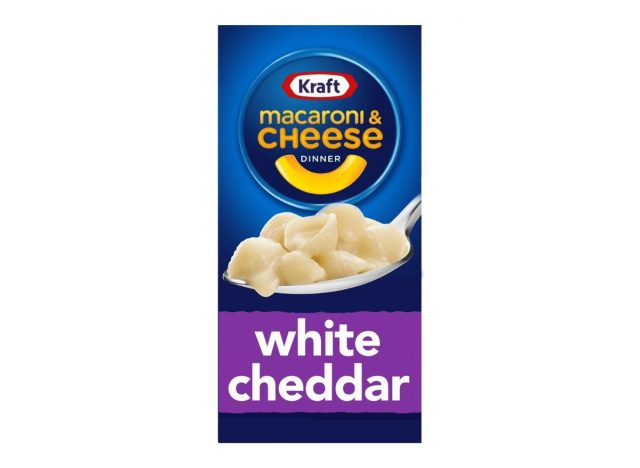
You may not think that the nutrition information for these Kraft White Cheddar Shells looks all that bad at first glance, but with 59 grams of carbohydrates and only two grams of fiber to slow digestion, you run the risk of spiking your blood sugar with this mac and cheese as your meal. The 670 milligrams of sodium is not the highest on the list, but it’s still less than ideal when choosing a boxed macaroni.
Chips, Pretzels & Snacks
Lay’s Sour Cream & Onion
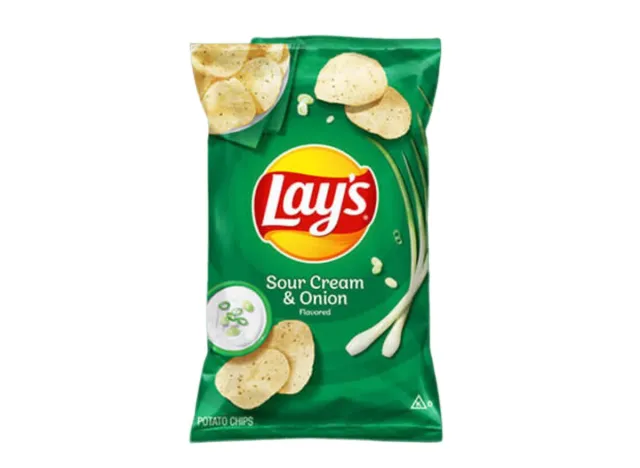
The perfect afternoon snack is one that has enough fiber and protein to keep you feeling satiated until your next meal, but potato chips don’t often meet this criteria. For instance, Lay’s Sour Cream & Onion chips contain only one gram of fiber and two grams of protein, so even if you chow down on a bowl of these, you’ll be left feeling hungry and unsatisfied.
Cheetos Puffs Flamin’ Hot

Cheeto’s Flamin’ Hot Puffs may taste delicious, but they’re not an ideal snack for those needing something to fill them up and satisfy their cravings. Not only do they have less than one gram of fiber and only one gram of protein, meaning they won’t fill you up at all, but each serving also contains 310 milligrams of sodium, which is a number that can easily add up when you’re digging into the bag.
Fritos Chili Cheese Flavored Corn Chips

The Fritos Chili Cheese Flavored Corn Chips have similar qualities to the other snacks on our list of unhealthy grocery store foods, such as higher levels of sodium and low levels of fiber and protein. In addition, these corn chips also contain maltodextrin as one of the first ingredients, which is an additive that has been associated with the possible alteration of your gut microbiome.
Bugles Nacho Cheese

Bugles may be satisfying in the immediate sense because of how savory they are, but they will leave you feeling hungry and unsatisfied because of their low fiber and protein content. This bag also contains six grams of saturated fat, almost half the recommended daily limit.
Snyder’s Honey Mustard & Onion

Snyder’s Honey Mustard & Onion contains only a gram of fiber, two grams of protein, and 240 milligrams of sodium per serving—which is only 1/3 of a cup.
If you’re really in the mood for pretzels, you’d be better off opting for a few regular pretzels dipped in hummus or eaten with a handful of your favorite vegetables for a more nutrient-dense snack.
Dorito’s Spicy Sweet Chili Chips

It’s safe to say that none of the Doritos varieties are considered healthy, but this Spicy Sweet Chili flavor is one of the worst. With almost 300 milligrams of sodium in a serving size of only 12 chips, it’s way too easy to go overboard when snacking on these, especially considering that the daily sodium limit is only 2,300 milligrams. Consistently eating too much sodium can lead to high blood pressure and other heart complications.
Processed Meats
Hormel Pepperoni

It’s important to proceed cautiously when you consume processed meat, especially if it’s consistent. Processed meat contains higher sodium levels and more preservatives to keep its shelf life longer, which research has shown may pose potential problems. Hormel Pepperoni contains 520 milligrams of sodium per serving and six grams of saturated fat. Not only that, but it contains sodium nitrite, an additive that has been linked to multiple types of cancer like colorectal, breast, and prostate.
Hillshire Farms Polish Kielbasa Pork Sausage

One sausage link should not have 720 milligrams of sodium—that is way too much, as you’ve already come close to a third of your daily max. The sodium levels aren’t the only thing you have to worry about, though, as this pork sausage from Hillshire Farms also contains sodium nitrites and phosphates.
Jimmy Dean Pork Sausage Links

The Pork Sausage Links from Jimmy Dean are less than ideal when you’re looking for breakfast meat, as this sausage contains almost 500 milligrams of sodium and nine grams of saturated fat in just three links.
Buddig Original Beef Lunchmeat
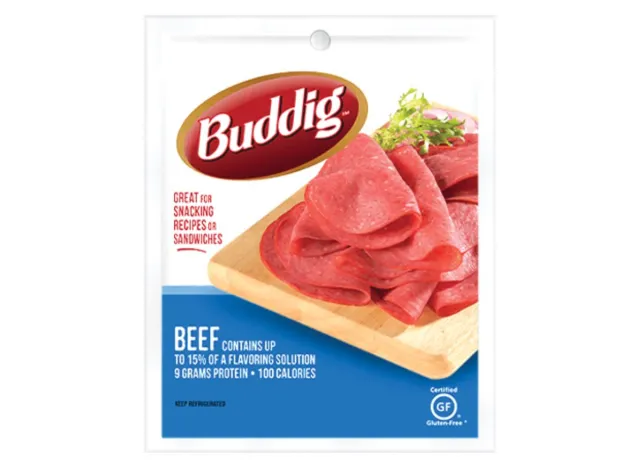
Sure, the nine grams of protein that you’re getting with each serving of Buddig Beef can help you stay full, but with 600 milligrams of sodium and sodium nitrite on the ingredients list, you’re better off steering clear of this processed meat.
Eckrich Cheddar Smoked Sausage

A good smoked sausage can be so delicious for breakfast or in a bun during a grill out, but it’s important to check the sodium levels for any type of sausage or hot dog on the market, as these meats are often loaded with salt as a preservative. Eckrich Cheddar Smoked Sausage has 670 milligrams of sodium per link, which is high considering the daily recommended maximum of 2,300 milligrams.
This sausage also contains sodium nitrite, a common meat preservative that has been linked to cancer.
Oscar Mayer Naturally Hardwood Smoked Bacon

The smell of bacon sizzling on the skillet in the morning is one of the best ways to start your day, but there are some bacon brands that are worse than others. Oscar Mayer Hardwood Smoked Bacon is one of the unhealthiest, as it contains two potentially harmful preservatives: sodium nitrite and sodium phosphates.
Great Value Thick Sliced Bacon
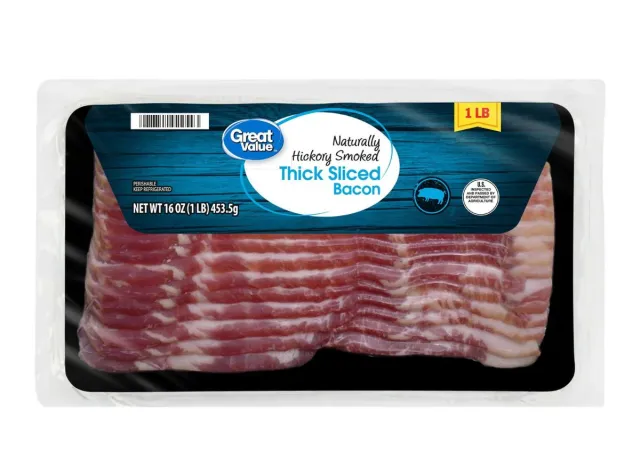
The serving size for Great Value’s Thick Sliced Bacon is only two slices, making it fairly easy to surpass without realizing it. With 430 milligrams of sodium and four grams of saturated fat per serving, not to mention the fact that it contains sodium phosphates and nitrite, it’s better to leave this item on the shelf.
Cereals & Granola
Honey Nut Cheerios
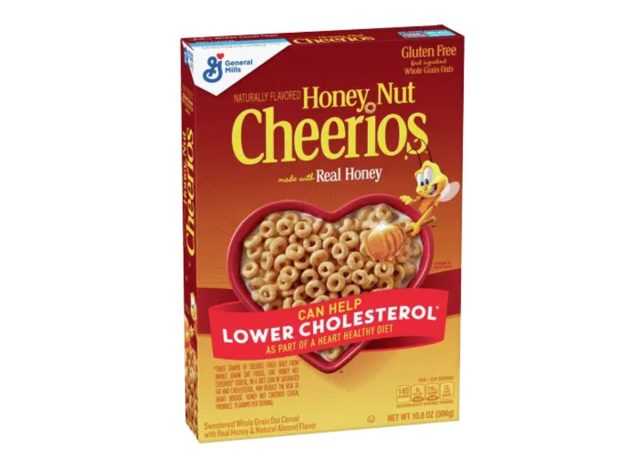
When you’re looking for cereal in the morning, you may want to skip Honey Nut Cheerios.
“This cereal contains high added sugars, contributing to excess calorie intake and increasing the risk of heart disease and high blood sugar levels,” says Lisa Young, PhD, RDN. “Though Honey Nut Cheerios are made from whole grain oats, they still undergo a lot of processing and contain unhealthy ingredients like brown sugar syrup, which adds to sugar content and harmful ingredients such as preservatives.”
Cinnamon Toast Crunch

Young also suggests passing on Cinnamon Toast Crunch, or enjoying it every once in a while instead of on a consistent basis. Why? Because “it contains a high amount of added sugar, which may cause spikes in blood sugar levels and increase the risk of weight gain and tooth decay,” she says. Young also adds that this sugary cereal “is low in essential nutrients such as fiber, vitamins, and minerals, thus not ideal for maintaining a nutritious diet.”
Froot Loops
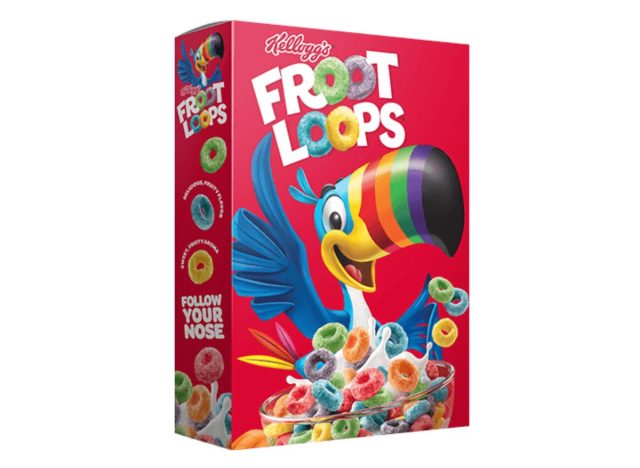
With 12 grams of added sugar and 210 milligrams of sodium, plus unwanted additives and artificial colorings, Froot Loops are considered one of the unhealthiest cereals you can buy.
“Its added sugars cover a significant amount of the daily added sugar intake, and consistent excess consumption can increase blood sugar levels,” says Young, adding, “They are calorie-dense but also low in fiber and protein, which are essential nutrients for satiety and weight management.”
Also, “Its ingredient list is concerning, as it contains additives, artificial colorings, and partially hydrogenated oil, which impacts cholesterol levels and increases the risk of heart disease.”
Krave Chocolate
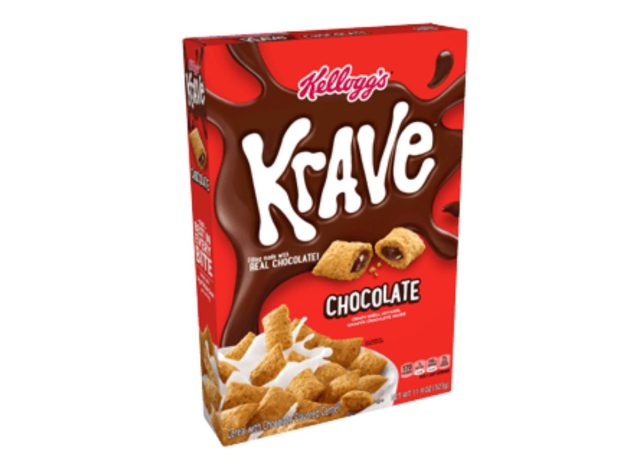
Young also lists Krave Chocolate among the unhealthiest grocery items. While being marketed as whole grain, this cereal is not the healthiest option, as it has high amounts of added sugar, with sugar being the primary ingredient,” she says. This is concerning because it can increase the risk of weight gain, heart disease, and diabetes.” Young also adds that Krave is “high in calories and relatively low in fiber, which does not provide a balanced breakfast.”
Cap’n Crunch

Cap’n Crunch may scratch the nostalgic itch, but eating this for breakfast won’t fill you up and may leave you with even more cravings than before.
“This cereal contains significant amounts of added sugars, which can contribute to weight gain and dental problems,” says Young. “It covers more than half of the recommended daily sugar intake, increasing the risk of chronic diseases such as heart disease and diabetes.”
Along with being high in sugar and low in fiber and protein, Cap’n Crunch is also “highly processed with artificial colors and preservatives like BHT food preservatives, yellow 5, and yellow 6, which may cause health concerns,” adds Young.
Oreo O’s
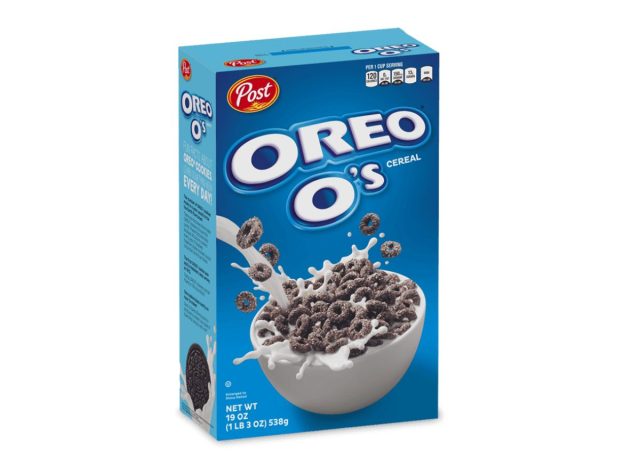
Unsurprisingly, a breakfast cereal inspired by Oreo cookies would be considered unhealthy. Oreo O’s may be a nostalgic choice for some, but this cereal delivers 17 grams of added sugar per serving and only 1 gram of fiber and protein, so there’s nothing to help keep you full or satiated at all. Eating a breakfast food like this will just spike your blood sugar and leave you feeling hungry.
Cookies & Pastries
Keebler Coconut Dreams

With 10 grams of sugar, six grams of saturated fat, and a serving size of only two cookies, it’s way too easy to rack up your sugar and fat counts in one sitting with these Keebler Coconut Dreams.
The nine grams of protein is a perk, but with so much added sugar and hardly any fiber to slow digestion, these cookies will leave you feeling hungry and wanting more.
Oreo Mega Stuff

Regular Oreos already lack nutritional value, and when you buy the Oreo Mega Stuf, you’re not just getting more creamy filling; you’re also getting more sugar, total fat, and saturated fat. Just one or two of these cookies doesn’t seem like much, but it’s easy to keep snacking until half of the box is gone, meaning it’s all too easy for these numbers to get even higher.
Hostess Pecan Spins
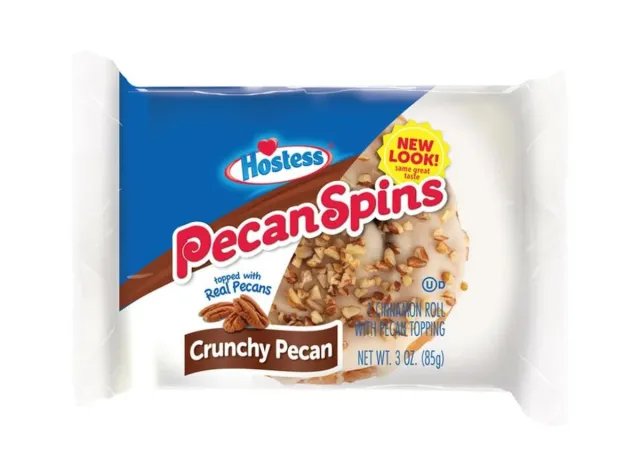
Hostess is a classic choice for to-go pastries you can get just about anywhere, but the ultra-processed nature of these snacks means they’ll fill you up with sodium, added sugar, and saturated fats and will leave you with more cravings afterward. For example, the Hostess Pecan Spins come with eight grams of saturated fat and 24 grams of sugar, meaning you’re getting awfully close to your daily limits with just one dessert.
Entenmann’s Chocolate Lover’s Variety Pack Donuts

There’s nothing better than the comfort of a box of Entenmann’s donuts in the morning, but starting your day off with these sugary, ultra-processed treats will leave you feeling hungry and unsatisfied throughout the day. Plus, they’re considered unhealthy grocery items because they’re high in sugar and saturated fat. For example, their Chocolate Frosted Donut contains 16 grams of sugar and 10 grams of saturated fat, which is way too high for just one donut.
Little Debbie Oatmeal Creme Pies

There’s something so comforting about a Little Debbie Oatmeal Creme Pie, so we aren’t saying you need to give them up for good. But with 13 grams of added sugar, three grams of saturated fat, and only one gram of fiber and protein, you’re better off saving this for a special occasion instead of snacking on it regularly.
Pop-Tarts Frosted Strawberry
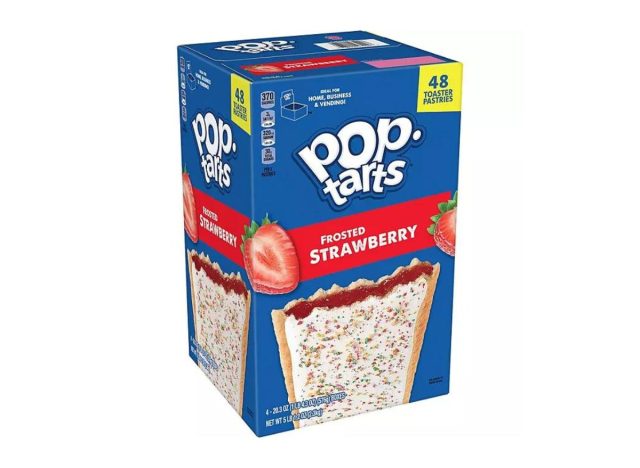
Pop-Tarts are marketed as a breakfast pastry, but starting your day off with 30 grams of added sugar and very little fiber and protein will leave you feeling sluggish and hungry, and it may possibly spike your blood sugar, too.
Breads, Tortillas & Wraps (Trista)
Wonder Bread

You won’t be surprised to find Wonder Bread on this list, as this white bread is notorious for lacking nutrients. “Wonder Bread is often considered unhealthy due to its use of highly refined white flour, which lacks essential nutrients and fiber, and this bread contains added sugars, such as high fructose corn syrup, which can contribute to weight gain and metabolic issues,” says Trista Best, MPH, RD, LD at Balance One Supplements.
Great Value Wheat Bread

Sometimes, even when bread brands use terms like “100% whole wheat,” they can still be considered unhealthy and lack essential nutrients. Take Great Value Wheat Bread, for example.
“This bread can be considered unhealthy due to its use of enriched wheat flour, which is a refined flour that has been stripped of its natural nutrients during processing, and while some nutrients are added back, it lacks the full nutritional benefits of whole grains,” says Best. “This type of flour can lead to quicker digestion and blood sugar spikes, making it less favorable for maintaining stable energy levels and overall health. Opting for whole-grain or whole-wheat bread that contains the entire grain kernel would offer more fiber, vitamins, and minerals.”
Old El Paso Flour Tortillas

Whether you’re making tacos, a quesadilla, or a burrito, you may want to pass on using Old El Paso Flour Tortillas.
“Old El Paso tortillas may not be considered healthy due to several factors, including their use of refined flour, which lacks essential nutrients and dietary fiber,” says Best. “Moreover, the inclusion of hydrogenated vegetable oil, which often contains harmful trans fats, can contribute to heart health concerns and inflammation. Trans fats have also been linked to an increased risk of heart disease and other health issues.”
Sara Lee Honey Wheat Bread

Another tricky term to watch out for that many bread companies use for marketing purposes is “honey wheat” because this bread is often just as unhealthy as white bread despite the mention of “wheat” (which, in reality, is just the grain that flour is made from).
“Sara Lee Honey Wheat Bread contains azodicarbonamide, a chemical compound used as a dough conditioner, that has raised concerns because it can break down into potentially harmful byproducts during baking,” says Best. “While it’s approved for use in some countries as a food additive, it’s banned in others, including the European Union, due to health considerations.”
Because of this, Best says, “Choosing bread options without additives like azodicarbonamide would be a more prudent choice for promoting a healthier diet and minimizing potential health risks.”
Mission White Corn Tortillas
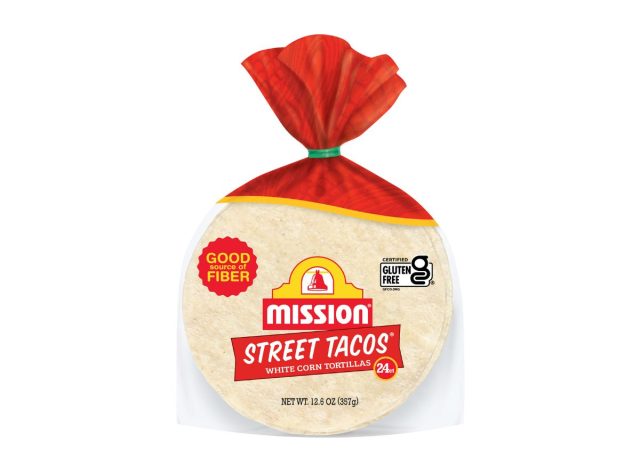
People often assume that corn tortillas are automatically the healthy choice when you’re in the mood for tacos, but this isn’t always true. Best tells us, “Mission White Corn Tortillas might be considered unhealthy due to the use of refined white corn flour, which lacks the dietary fiber and nutrients present in whole corn.”
She adds, “These tortillas may lack the satiety and sustained energy benefits that whole-grain options provide, and they contain unhealthy fats and excessive sodium, which can contribute to high blood pressure and other heart health issues.”
Sunbeam Texas Toast

Like other breads on our list, this Thick Sliced Texas Toast from Sunbeam lacks nutritional value and essential nutrients. Although the levels of fat and sugar are certainly on the lower end, so is the fiber, meaning this product may spike blood sugar levels.
Sodas
Crush Pineapple

In general, regular soda consumption has been linked to an increased risk of health complications like diabetes, heart disease, and liver cancer. However, some sodas are considered even worse than others because of their sugar content. Take Crush Pineapple, which has a whopping 85 grams of added sugar per bottle.
Sunkist Fruit Punch

When you’re drinking your sugar calories in the form of soda, you’re not consuming any fiber or protein to slow down how fast the sugar hits your bloodstream, which can cause spikes in your blood sugar.
When it comes to sodas that have the most sugar and are, therefore, some of the unhealthiest choices, Sunkist Fruit Punch is up there with 80 grams of sugar per bottle.
Mug Cream Soda

Mug Cream Soda is a sweet and classic beverage, but it’s one that you may want to keep as a “once in a while” option, as this soda packs in almost 80 grams of sugar per bottle.
Mello Yello

Another sugar bomb of a soda is Mello Yello, which has 77 grams of sugar per bottle. Even though you may not see as much of them in stores right now, which the company says is because they’re focusing on more popular products, it’s still one to watch out for when you see it in stores. This isn’t to say you have to ditch it altogether, but it may be best to consume this one in moderation.
Mountain Dew Live Wire

The original Mountain Dew is popular, but their Live Wire flavor adds a nice orange twist. However, the 77 grams of sugar is less than ideal, especially knowing that it won’t give you any fiber or protein to help prevent blood sugar spikes.
Fanta Pineapple

As you can see, some of the fruitiest sodas are the ones that contain the most sugar, and Fanta Pineapple is no exception. With 80 grams of sugar and 300 calories per bottle, you’ll spike your blood sugar instantly and may be left feeling hungrier and with more cravings.
Other Bottled Drinks
Starbucks Bottled Mocha Frappuccino

A delicious bottled coffee can be the perfect solution when you need something quick, easy, and on the sweeter side, but this Starbucks Bottled Mocha Frappuccino is one of the unhealthiest grocery store coffee options with its 45 grams of sugar and 270 calories in just one serving.
High Brew Mexican Vanilla Cold Brew

High Brew Mexican Vanilla Cold Brew is better for you than the Starbucks Bottled Frappuccino when it comes to sugar, fat, and calorie content, but starting your day off with 14 grams of sugar in just your drink alone is still risky when it comes to potentially causing a spike in your blood sugar.
Simply Fruit Punch

Don’t be fooled by tricky marketing that tries to make certain drinks look healthy when they simply are not. Simply Fruit Punch is a great example, as it’s full of 25 grams of sugar and no fiber or protein to stop your blood sugar from spiking. You’ll also notice on the ingredients list that cane sugar is the second ingredient behind water, which you want to avoid when looking for real fruit juice.
Welch’s Grape Juice
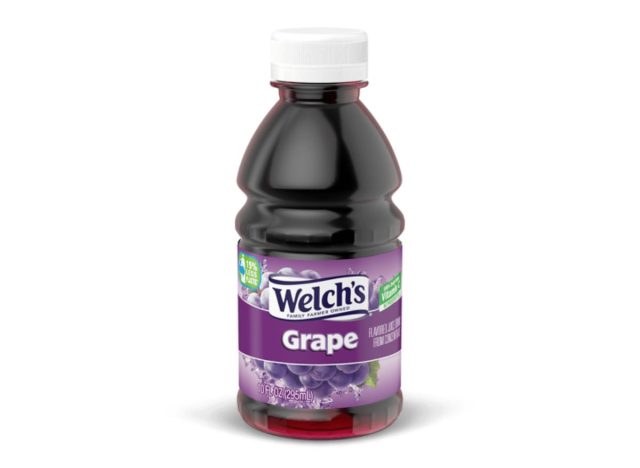
With water and high fructose corn syrup as the first two ingredients, this grape juice from Welch’s is far from the “real thing.” It does contain grape concentrate, but this beverage is mostly sugar. If you’re looking for fresh fruit juice, you’ll want to skip over this one at the store.
Bolthouse Strawberry Banana Drink
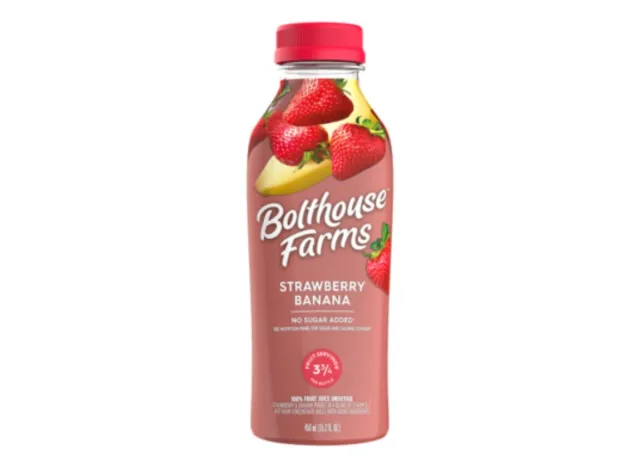
Another example of tricky marketing is this Strawberry Banana bottled smoothie from Bolthouse Farms. When you see the word “smoothie,” you may automatically assume it is a healthy product, but this drink is mostly full of sugar. Although you are getting five grams of fiber, you’re still getting 50 grams of sugar and almost no protein, so it won’t give you any staying power at all.
Frozen Foods
Marie Callender’s Chicken Pot Pie
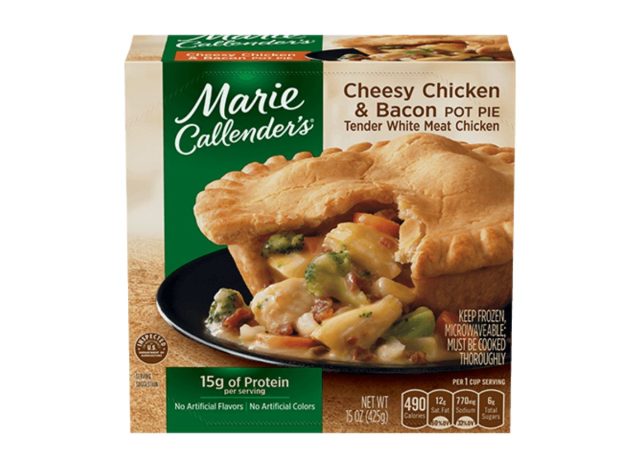
When choosing frozen foods, it’s important to look out for high levels of sodium and fat, especially saturated and trans fats, and harmful preservatives. In Marie Callender’s Chicken & Bacon Pot Pie, you’re getting 790 milligrams of sodium, as well as 13 grams of saturated fat—which is your entire recommended daily limit!
Banquet Mega Pizza Double Stuffed Four Meat

Just one slice of this Double Stuffed Four Meat Pizza from Banquet contains over 1,000 milligrams of sodium, but if you eat both slices, you’ll be nearing your daily sodium limit in just one sitting.
In addition to the high levels of sodium, this pizza contains some potentially harmful preservatives, such as sodium nitrites.
Jimmy Dean Pancake & Sausage On a Stick

A protein-packed breakfast sausage can be a great addition to your breakfast meal, but you may want to pass on wrapping it in pancake dough. This frozen Pancakes & Sausage on a Stick from Jimmy Dean comes packed with preservatives, including items like sodium phosphate, which has been linked to potential negative health outcomes.
El Monterey Chicken Enchiladas

The 21 grams of protein in these frozen enchiladas is ideal, but the 890 milligrams of sodium and 12 grams of saturated fat are not. Because it almost reaches your daily saturated fat limit and over a third of your sodium intake, you’re better off making your enchiladas at home.
Bob Evans Farms Sausage and Potatoes Bowl

The idea of having a hot egg and sausage breakfast ready to go in minutes is appealing, but when you see the 12 grams of saturated fat and almost 1,500 milligrams of sodium, you may want to consider other options.
Banquet Sweet & Spicy Asian Style Boneless Strips

We can discuss the six grams of saturated fat or the use of sodium phosphates in these Sweet & Spicy Asian Style chicken strips from Banquet, but the number one concern that needs to be mentioned is the shocking 2,650 milligrams of sodium per serving! That is hundreds more milligrams than is recommended in an entire day.
Ice Cream & Dessert
Little Debbie Nutty Buddy Snack Bars

A dessert or snack that will bring back childhood memories for most people, Nutty Buddy Bars are far from healthy. They’re full of 20 grams of sugar—almost the American Heart Association‘s recommended daily limit. Not only that, but you’re also getting 8 grams of saturated fat, and when you consider the suggested daily limit of around 13 grams, having 8 is a lot in just your dessert.
Ben & Jerry’s Peanut Butter Cup Ice Cream

When you’re in the mood for a sweet treat, Ben & Jerry’s always delivers. But with flavors like Peanut Butter Cup—which contains 18 grams of saturated fat, 34 grams of sugar, and 0.5 grams of trans fat per serving—it’s best to save it for special occasions instead of getting used to eating it on a regular basis. Not to mention that these numbers are for a small serving size of just 2/3 cup, and it’s all too easy to eat more.
Ben & Jerry’s Chubby Hubby

Another beloved Ben & Jerry’s flavor—Chubby Hubby—is considered an unhealthy grocery item because it has more saturated fat in a serving than what is recommended in an entire day! It also contains 35 grams of sugar and 106 grams if you decide to indulge in the whole pint.
Lotus Biscoff White Chocolate Bars

With the combination of white chocolate, cookie butter, and Biscoff cookies, these Cookie Butter Ice Cream Bars are a sweet and satisfying dessert. However, moderation is best here because you’re still getting 24 grams of sugar and nine grams of saturated fat in just one bar.
Magnum Double Caramel Ice Cream Bars

Magnum serves up some deliciousness with these Double Caramel Ice Cream Bars, but stick to just one if you can. You’ll still consume close to your daily saturated fat limit, along with 22 grams of sugar in one bar. The fiber and protein content is super low, so you won’t have anything to slow down your blood sugar spikes.
Häagen-Dazs’ Chocolate Peanut Butter Ice Cream

Another classic ice cream company to grab a pint from is Haagen-Dazs, which offers a variety of affordable flavors at most grocery stores. Unfortunately, even though their Chocolate Peanut Butter flavor is to die for, it won’t deliver what you want regarding nutrition. One serving will get you nine grams of saturated fat and 21 grams of sugar, so you’re better off finding something on the lighter end.
- Source: https://www.health.harvard.edu/heart-health/the-sweet-danger-of-sugar#:~:text=%22The%20effects%20of%20added%20sugar,and%20stroke%2C%22%20says%20Dr.
- Source: https://www.heart.org/en/healthy-living/healthy-eating/eat-smart/sugar/how-much-sugar-is-too-much#:~:text=AHA%20Sugar%20Recommendation&text=Men%20should%20consume%20no%20more,32%20grams)%20of%20added%20sugar!
- Source: https://www.fda.gov/food/nutrition-education-resources-materials/sodium-your-diet#:~:text=Americans%20eat%20on%20average%20about,1%20teaspoon%20of%20table%20salt!
- Source: https://www.heart.org/en/healthy-living/healthy-eating/eat-smart/fats/saturated-fats
- Source: https://www.fda.gov/food/food-additives-petitions/final-determination-regarding-partially-hydrogenated-oils-removing-trans-fat
- Source: https://www.fda.gov/food/nutrition-education-resources-materials/sodium-your-diet#:~:text=Americans%20eat%20on%20average%20about,recommended%20limits%20are%20even%20lower.
- Source: https://www.ncbi.nlm.nih.gov/pmc/articles/PMC3278747/
- Source: https://www.heart.org/en/healthy-living/healthy-eating/eat-smart/fats/saturated-fats
- Source: https://journals.plos.org/plosone/article?id=10.1371/journal.pone.0052132
- Source: https://www.fda.gov/food/nutrition-education-resources-materials/sodium-your-diet
- Source: https://www.nature.com/articles/s41538-022-00174-y
- Source: https://academic.oup.com/eurpub/article/31/Supplement_3/ckab165.244/6406211
- Source: https://www.ncbi.nlm.nih.gov/pmc/articles/PMC7318881/
- Source: https://www.ncbi.nlm.nih.gov/pmc/articles/PMC9654915/
- Source: https://www.hsph.harvard.edu/nutritionsource/healthy-drinks/sugary-drinks/
- Source: https://www.heart.org/en/healthy-living/healthy-eating/eat-smart/sugar/how-much-sugar-is-too-much#:~:text=AHA%20Sugar%20Recommendation&text=Men%20should%20consume%20no%20more,32%20grams)%20of%20added%20sugar!
- Source: https://www.heart.org/en/healthy-living/healthy-eating/eat-smart/fats/saturated-fats









